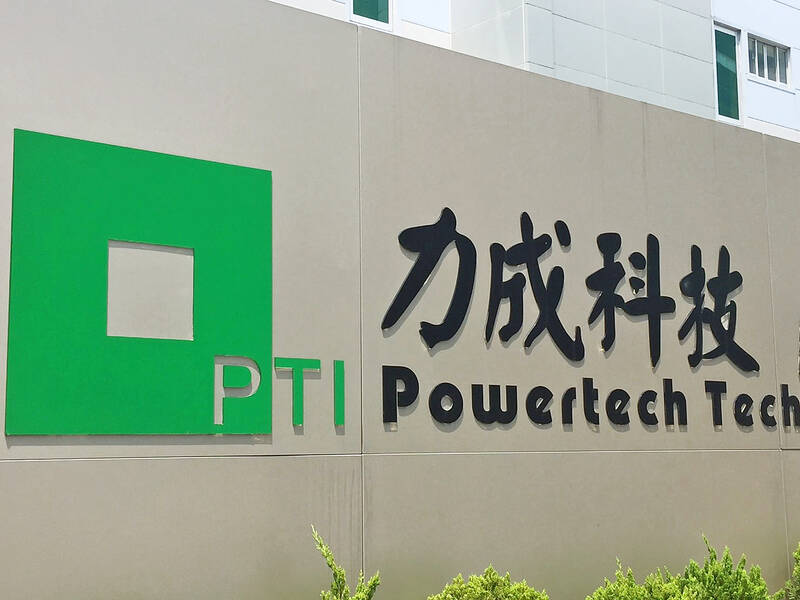Memorychip testing and packaging services provider Powertech Technology Inc (力成科技) expects revenue this year to grow at an annual single-digit percentage rate, driven primarily by robust demand for artificial intelligence (AI) devices and data centers this quarter.
The company is investing heavily in advanced packaging technologies including panel-level packaging and chip-on-wafer-on-substrate (CoWoS) technologies to further capture AI opportunities, and is in talks with customers to provide CoWoS solutions, CEO Boris Hsieh (謝永達) told an investors’ conference yesterday.
The company aims to provide a complete CoWoS solution rather than only providing the easier part of the back-end solution, he said.

Photo: Grace Hung, Taipei Times
AI applications accounted for 8 percent of the company’s revenue last quarter, rising from 6 percent in the second quarter and 4 percent in the first quarter.
This year’s growth momentum would also be fueled by the spillover effect of a high bandwidth memory (HBM) expansion, Hsieh said.
That means Powertech has a chance to receive more orders to provide standard DRAM chip testing and packaging services from the world’s three major memorychip makers, which have allocated significant capacity to produce HBM DRAM chips to support surging AI demand.
Revenue last year plummeted about 16 percent to NT$70.44 billion (US$2.19 billion) amid the global semiconductor industry’s worst slump in more than 20 years, it said.
“The total consolidated revenue can still grow by a single-digit percentage year-on-year this year in the absence of revenue from China’s Xian plant,” Hsieh said.
Powertech previously produced standard DRAM chips for Micron Technology Inc at the Xian plant based on a supply agreement, which expired in June.
As a result, Powertech’s revenue dropped 6.6 percent quarterly, and down 0.8 percent annually, to NT$18.3 billion last quarter.
Net profit fell 7 percent to NT$2.15 billion last quarter, from NT$2.31 billion the previous quarter, as the company posted nonoperating losses of NT$63 million in the quarter, mainly due to significant foreign exchange losses, it said.
On an annual basis, net profit rose 8 percent from NT$1.99 billion.
Gross margin improved to 21.4 percent last quarter from 19 percent in the previous quarter and 17.8 percent in the same period last year, the company said.
In the first three quarters, total net profit soared 27.5 percent annually to NT$6.57 billion, from NT$5.16 billion, while earnings per share rose to NT$7.05 from NT$5.41 and revenue increased 9.4 percent to NT$56.22 billion from NT$51.41 billion, it said.

SEMICONDUCTORS: The German laser and plasma generator company will expand its local services as its specialized offerings support Taiwan’s semiconductor industries Trumpf SE + Co KG, a global leader in supplying laser technology and plasma generators used in chip production, is expanding its investments in Taiwan in an effort to deeply integrate into the global semiconductor supply chain in the pursuit of growth. The company, headquartered in Ditzingen, Germany, has invested significantly in a newly inaugurated regional technical center for plasma generators in Taoyuan, its latest expansion in Taiwan after being engaged in various industries for more than 25 years. The center, the first of its kind Trumpf built outside Germany, aims to serve customers from Taiwan, Japan, Southeast Asia and South Korea,

Gasoline and diesel prices at domestic fuel stations are to fall NT$0.2 per liter this week, down for a second consecutive week, CPC Corp, Taiwan (台灣中油) and Formosa Petrochemical Corp (台塑石化) announced yesterday. Effective today, gasoline prices at CPC and Formosa stations are to drop to NT$26.4, NT$27.9 and NT$29.9 per liter for 92, 95 and 98-octane unleaded gasoline respectively, the companies said in separate statements. The price of premium diesel is to fall to NT$24.8 per liter at CPC stations and NT$24.6 at Formosa pumps, they said. The price adjustments came even as international crude oil prices rose last week, as traders

Taiwan Semiconductor Manufacturing Co (TSMC, 台積電), which supplies advanced chips to Nvidia Corp and Apple Inc, yesterday reported NT$1.046 trillion (US$33.1 billion) in revenue for last quarter, driven by constantly strong demand for artificial intelligence (AI) chips, falling in the upper end of its forecast. Based on TSMC’s financial guidance, revenue would expand about 22 percent sequentially to the range from US$32.2 billion to US$33.4 billion during the final quarter of 2024, it told investors in October last year. Last year in total, revenue jumped 31.61 percent to NT$3.81 trillion, compared with NT$2.89 trillion generated in the year before, according to

PRECEDENTED TIMES: In news that surely does not shock, AI and tech exports drove a banner for exports last year as Taiwan’s economic growth experienced a flood tide Taiwan’s exports delivered a blockbuster finish to last year with last month’s shipments rising at the second-highest pace on record as demand for artificial intelligence (AI) hardware and advanced computing remained strong, the Ministry of Finance said yesterday. Exports surged 43.4 percent from a year earlier to US$62.48 billion last month, extending growth to 26 consecutive months. Imports climbed 14.9 percent to US$43.04 billion, the second-highest monthly level historically, resulting in a trade surplus of US$19.43 billion — more than double that of the year before. Department of Statistics Director-General Beatrice Tsai (蔡美娜) described the performance as “surprisingly outstanding,” forecasting export growth